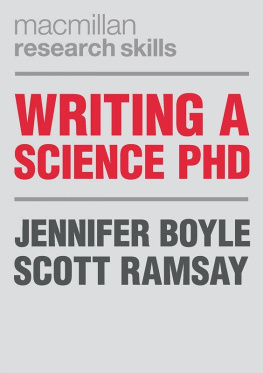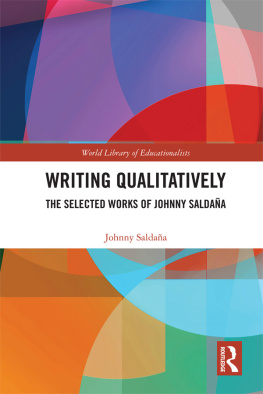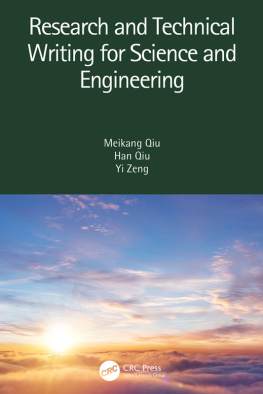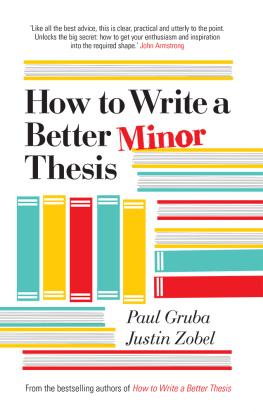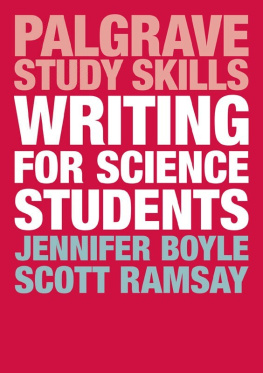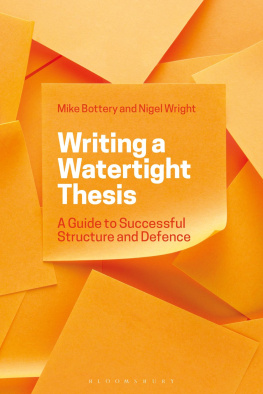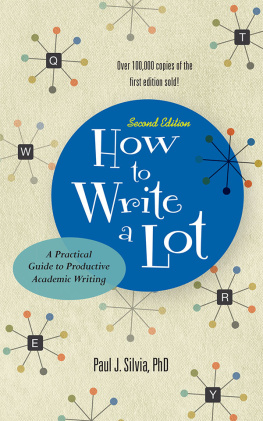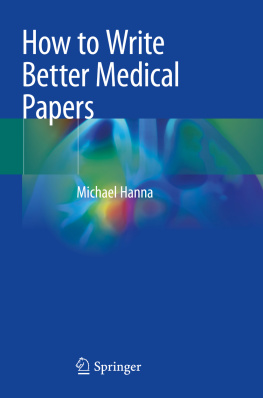Writing a Science PhD
Research Skills
Authoring a PhD
The Foundations of Research (3rd edn)
Getting to Grips with Doctoral Research
Getting Published
The Good Supervisor (2nd edn)
The Lean PhD
PhD by Published Work
The PhD Viva
The PhD Writing Handbook
Planning Your Postgraduate Research
The Postgraduate Research Handbook (2nd edn)
The Professional Doctorate
Structuring Your Research Thesis
Writing a Science PhD
Teaching and Learning
Series Editor: Sally Brown
Access to Higher Education
Coaching and Mentoring in Higher Education
Facilitating Work-Based Learning
Facilitating Workshops
For the Love of Learning
Fostering Self-Efficacy in Higher Education Students
Internationalization and Diversity in Higher Education
Leading Dynamic Seminars
Learning, Teaching and Assessment in Higher Education
Learning with the Labyrinth
Live Online Learning
Masters Level Teaching, Learning and Assessment
Reimagining Spaces for Learning in Higher Education
Successful University Teaching in Times of Diversity
Writing a Science PhD
Jennifer Boyle and Scott Ramsay

Jennifer Boyle and Scott Ramsay, under exclusive licence to Springer Nature Limited 2019
All rights reserved. No reproduction, copy or transmission of this publication may be made without written permission.
No portion of this publication may be reproduced, copied or transmitted save with written permission or in accordance with the provisions of the Copyright, Designs and Patents Act 1988, or under the terms of any licence permitting limited copying issued by the Copyright Licensing Agency, Saffron House, 610 Kirby Street, London EC1N 8TS.
Any person who does any unauthorized act in relation to this publication may be liable to criminal prosecution and civil claims for damages.
The authors have asserted their rights to be identified as the authors of this work in accordance with the Copyright, Designs and Patents Act 1988.
First published 2019 by
RED GLOBE PRESS
Red Globe Press in the UK is an imprint of Springer Nature Limited, registered in England, company number 785998, of 4 Crinan Street, London N1 9XW.
Red Globe Press is a registered trademark in the United States, the United Kingdom, Europe and other countries.
ISBN 9781352006308 paperback
This book is printed on paper suitable for recycling and made from fully managed and sustained forest sources. Logging, pulping and manufacturing processes are expected to conform to the environmental regulations of the country of origin.
A catalogue record for this book is available from the British Library.
A catalog record for this book is available from the Library of Congress.
Contents
Acknowledgements
We would like to thank the former PhD students who contributed their recommendations to you, which youll find spread throughout this book: Mai-Britt Jensen; Fabian Kellermeier; Christine Merrick; Lydia Soraya Murray; Anne Tierney; and Angela Wilson. We also wish to thank the editors at Nature Research, who contributed their experiences of what they thought their PhD would be like, and what they actually turned out to be: Dr Joo H. Duarte, Senior Editor, Nature Biomedical Engineering; Iulia Georgescu, Chief Editor, Nature Reviews Physics; Marios Karouzos, Senior Editor, Nature Astronomy; and Bart Verberck, Regional Executive Editor, Nature Research. We would also like to thank our current PhD students. Particular thanks go to Sejal Modha for kindly sharing her abstract writing technique. Finally, thanks to our own PhD supervisors, Dr Peter Dominy and Dr Marilyn Dunn, for helping us shape our own writing practice and style over the course of our PhDs.
Introduction
This book aims to give you the knowledge and skills you need to write your PhD thesis. Undertaking a PhD is a huge task, which involves not only working at the highest academic level, but also transitioning from the role of student to researcher and becoming fully integrated into the academic community. While there are many books available on writing the thesis, none talk specifically to science students, who deal with a range of challenges specific to their discipline.
In this book, well talk about:
how to formulate your research question
how to gather relevant literature
how to record literature, and how to critique what you find
how to discuss existing work in relation to your own
how to factor writing time into your schedule, and how to make that time as efficient as possible
how to structure your work, from the smallest scale to the largest, to ensure clear and concise communication
how publication can be part of your PhD
how to tackle common roadblocks.
We hope that youll find the information here practical, easily accessible and relevant to your specific needs. We work with PhD students at every stage of their research, and so the advice we offer is grounded on the needs of those students and the questions they most commonly ask us.
This book assumes that you are writing a traditional thesis that is, not a thesis by publication. The thesis by publication route is still in the minority in the UK (its unusual at our own research-intensive institution, for example), but is gradually increasing in visibility as a viable option.
The term PhD by publication can mean two things:
The first type of PhD by publication refers specifically to the process by which a candidate can submit a portfolio of previously published work to their institution in order to be considered for the award of PhD. This is usually open only to members of staff or graduates of that specific institution who have built up a suitable research portfolio throughout the course of their career.
The second type, and the type that is likely more applicable to you, is also known as an alternative format thesis, or a journal format thesis. In this kind of thesis, chapters and sections are explicitly written as journal articles, and have usually already been published, or are in the process of publication, or have been submitted to a journal for consideration.
It should be noted that this type of PhD thesis must still be coherent the chapters/articles cannot be wholly disparate. The candidate is expected to produce an introduction which contextualises the work and makes the connection between the chapters/papers clear. Equally, there needs to be a strong conclusion/discussion/summary which draws the work together. Remember, too, that there is likely to be some additional material required in terms of overall analysis and reflection, and possibly further/more in-depth reference made to related work.
While we cover material that will still be useful to you in terms of writing practice, editing, etc., you should make sure you are familiar with your relevant institutional guidelines and assessment criteria. The format and expected number of papers can vary from institution to institution, and across subject areas within institutions, so you need to be fully informed and completely clear on what is expected of you.
There are many disciplines and specialisms within the sciences. Weve tried to keep this book as open as possible in terms of the advice offered and used examples which should, hopefully, be accessible to all. When subject-specific differences might arise, we will flag this in the text to allow you to check your own specific conventions with your supervisor and departmental guidelines.
Next page
